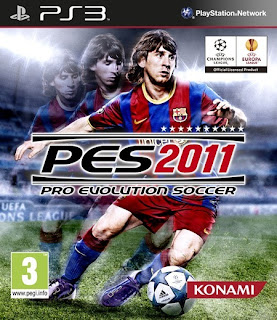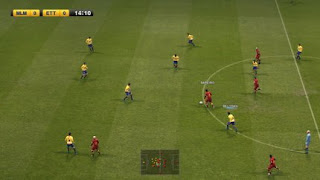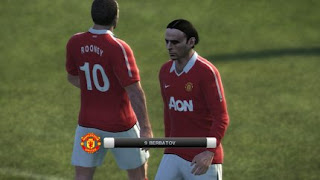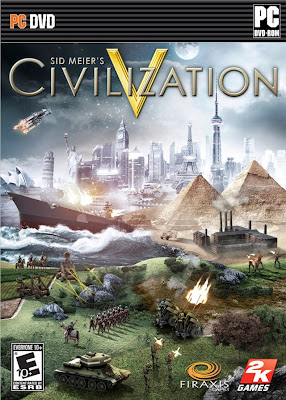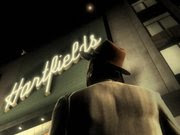The Pro Evolution Soccer series has been stuck in a rut for the past few years, with gameplay that has stagnated and a feature set that has failed to keep up with rival FIFA. Thankfully, Pro Evolution Soccer 2011 addresses these criticisms, with improved gameplay, new features such as the Online Master League, and a higher visual standard than ever before. It's certainly slower and more difficult than last year's game, and therefore takes longer to learn, but as it retains the same fluid gameplay, fans of the series should embrace the changes. It's not in the same league as FIFA when it comes to online integration and presentation, but it's a welcome return to form for a series that has spent the last few years in relegation territory.
Pro Evolution Soccer 2011 Video Review
Fans of the series should appreciate how different the gameplay is within seconds of picking up a controller. The control system has been tweaked so that you now have to guide the ball much more precisely using the new power bar that appears above players' heads. Whereas passes previously found their way to the recipients' feet automatically, you now have to combine power and direction to place the ball exactly where you want it to go. This can result in a frustrating number of misguided passes at first, but as you get used to the system, you can mix up passing styles and really control the movement of the ball, rather than being dependent on where the AI player happens to be. The game is slower and more considered as a result, and it rewards players who master these techniques by allowing them to dictate the flow of the game.
The improved control system complements the new player animations, which are more graceful and realistic than before. There's a much better feeling of physicality between players as they jostle for the ball; if it's in the air, for example, players will compete for the header in a convincing manner. The downside to this physicality is that the game is now too strict on fouls; if you attempt to put pressure on an attacker, you can expect him to fall over and earn himself a free kick as a result. However, the impact of the changes is mostly positive--players no longer perform the same animations en masse (such as before kickoff), and you can even see their eyes following the ball during replays, which adds to the realism.
Last year's Pro Evo boasted accurate player likenesses, but thanks to an overall graphical improvement this year, the game is finally looking like a true current-generation title. Aside from better-looking players, the onscreen information is presented more efficiently, with power bars above players' heads, rather than at the bottom of the screen. The default camera position has changed to a lower TV-style wide angle, performing more dynamic movements as it's tracking the action, even if it is occasionally slow to keep up. There has also been a change to the commentary team; while Jon Champion remains, Jim Beglin replaces Mark Lawrenson as the analyst. He adds a little more insight and enthusiasm to the discussion, but overall the commentary is still one of Pro Evo's weak points.
Pro Evolution Soccer 2011 offers all of the same major game modes as last year but expands on them in minor ways. The UEFA Champions League mode makes a return this year and is joined by the South American Copa Libertadores tournament as well. The televisual presentation of both events is replicated with aplomb, including official memorabilia in the menus and Beethoven's Ode to Joy before each game. Both Become a Legend, where you create a player and take him through a career, and Master League, where you perform managerial duties, make a return, and you can now compete in the UEFA Super Cup and UEFA Europa Leagues in these modes, if your team is eligible to enter them. Otherwise, these modes are very similar to those in last year's game--the Master League offers a tremendous amount of depth through its player transfer, training and tactical options, but it's essentially the same as it was last year.
Fortunately, this year's game packs in more online elements than ever before. Once you've created a profile, there are a variety of standard unranked and ranked match options (with up to eight players in unranked friendlies and up to four players in ranked). The biggest addition, though, is the Online Master League. This mode allows you to compete online with other people, and use prize money to bring more talent into your squad. Once you've chosen your team, you're given an allowance of currency (euros, dollars, pounds or yen) with which you can enter matches and buy players. If you win or draw matches, you earn more money, with quick matches resulting in a cut of the tickets, while multi-match competitions offer a share of tickets as well as prize money. The player market is well implemented, as player values change constantly depending on demand. A ticker tape at the top of the menu alerts you to players who are a good deal, or perhaps overvalued. These mechanics and the risk/reward dynamic prove to be particularly addictive, meaning you'll have a hard time putting down the Online Master League once you get going.
The series has long offered a host of customisable options for those who have braved the previous menu systems, and thankfully the improved presentation this year makes it less daunting to do so. Thanks to a revised pitch display, it's easy to make substitutions simply by grabbing the player off the pitch in the menu. The big new feature is customisable feints, which can be mapped to the right analogue stick, allowing you to flick four different directions to link special moves together on the pitch. You can choose from a long list of different flicks and shimmies and then save multiple sets of your customised feints to switch between midmatch. Sadly, you can't share your customisation setups online, but the system adds a welcome level of personalisation to the skills options.
One of the most welcome changes is that this year's game doesn't take itself too seriously, which is ably demonstrated by the slew of unlockable content. As you play through the game and earn credits, you can spend them unlocking items such as pillows and giant sweets for balls, pumpkin heads for your players, retro sounds from Konami games such as Frogger and Contra, and stadium fencing themed on other Konami games such as Gradius and Castlevania. The game also has a comprehensive editor that lets you tweak all aspects of your stadium, from the grass patterns and lighting, to the stands and seating, but it's disappointing that you can't then upload and share your creations online; you can only save them as a data file to share with friends. You can also edit team emblems this year, either by importing an image, by taking a photo using a camera attached to the system, or by using a rudimentary drawing system similar to a desktop paint program. You can also import your own audio for crowd chants and assign them to your favourite teams, although you have to produce the audio file on a computer or other recording device, rather than in the game.
One of Pro Evo's longest-running niggles has been the lack of officially licensed teams and players, and while there are more official teams in the game than ever before, this issue hasn't been completely resolved in Pro Evo 2011. If you're online, you can download fan-made update data to remedy this issue, and the inclusion of the Copa Libertadores expands the number of officially licensed club teams from Argentina, Bolivia, Brazil, and Mexico. Alas, only two English premiership teams have the official kits including sponsors--this time it's Manchester United and Tottenham Hotspur--but the French and Dutch premier leagues are there in full. Overall, the presentation is much better, but there are still a lot of menus to click through even when you're trying to do things as simple as play online.
Pro Evolution Soccer 2011 represents an impressive upswing for the series--it finally fixes some long-term issues, includes welcome new features, and boasts much stronger visuals. But the biggest news is that this game is a genuine upgrade in terms of playability, with much deeper gameplay thanks to its new passing and animation systems. As the start of what will hopefully be a new era for the franchise, this a comeback that newcomers and Pro Evo veterans shouldn't miss out on.
Pro Evolution Soccer 2011 represents an impressive upswing for the series--it finally fixes some long-term issues, includes welcome new features, and boasts much stronger visuals. But the biggest news is that this game is a genuine upgrade in terms of playability, with much deeper gameplay thanks to its new passing and animation systems. As the start of what will hopefully be a new era for the franchise, this a comeback that newcomers and Pro Evo veterans shouldn't miss out on.
Source: GameSpot

